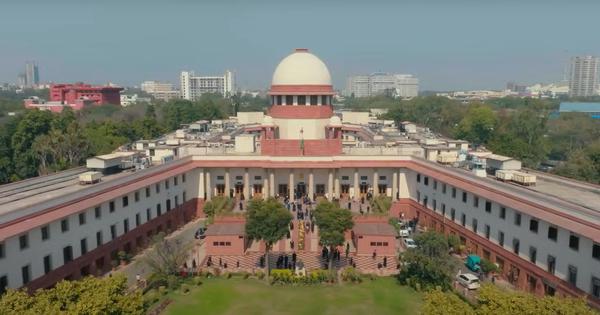
The Supreme Court on Tuesday questioned the interpretation of Article 200 of the Constitution that allowed governors to withhold their assent to bills passed by legislatures, asking whether this would mean that even money bills could be stalled indefinitely, Live Law reported.
Noting that money bills are bound to be approved, a bench of Chief Justice BR Gavai and Justices Surya Kant, Vikram Nath, PS Narasimha and AS Chandurkar orally remarked that such an interpretation of the article was “problematic”.
The bench has been hearing arguments on a reference made to the court by President Droupadi Murmu about its April 8 ruling that set timelines for governors and the president to grant assent to bills passed by legislatures.
The court had issued a notice on July 22 to the Centre and all state governments on the reference.
During the hearing on Tuesday, the court asked whether it was expected to not take any action if the president or governors indefinitely withheld granting assent to bills passed by state legislatures for years, Bar and Bench reported.
“Suppose a bill is passed in 2020,” Bar and Bench quoted the court as saying. “Will the court be powerless if there is no consent even in 2025?”
Advocate Neeraj Kishan Kaul, for the Madhya Pradesh government, said that such matters were best left to Parliament to decide. He added that the starting point of such discussions cannot be based on a presumption that there will be a misuse of the discretionary powers granted to the president or governors.
“As far as timelines are concerned, it is impossible to say within this time the governor or president must decided,” Kaul was quoted as saying.
Advocate Harish Salve, representing the Maharashtra government, said that the framers of the Constitution had created a system in which the Union government could also prevent a bill passed by a state Assembly from becoming a law. This was a matter of higher discretion, he added.
“The language of [Article] 201 does not admit to any such limitation [against veto],” Bar and Bench quoted Salve as saying. “Using the word ‘veto’ would be an uncharitable characterisation…Yes, he has the power to withhold…Veto is a word we use for personal interest and the governor does not have so.”
Article 201 charts out what happens when a governor reserves a state bill for the president’s consideration.
Gavai asked whether the Union government could also use such a power even if the bill fell under the state list, to which Salve said that it could.
The bench also asked that if a governor at the threshold could withhold a bill, he could then also withhold a money bill.
In response, Salve said that the governor could do this.
However, Solicitor General Tushar Mehta said that the question does not arise as a money bill is introduced with the recommendation of the governor under Article 207.
The court’s April 8 ruling came on a petition filed by the Tamil Nadu government after Governor RN Ravi did not act on several bills for more than three years before rejecting them and sending some to the president.
The court held that governors must decide on bills within a reasonable time and cannot delay indefinitely under Article 200. Similarly, the president must act within three months under Article 201, and any delay beyond that must be explained and communicated to the state government. Both provisions outline the process of assent to bills by governors and the president.
The judgement had also introduced the concept of “deemed assent” in cases of prolonged inaction, allowing pending bills to be considered approved.
In May, Murmu made the reference to the court under Article 143(1) of the Constitution with regard to its April 8 ruling.
Article 143(1) allows the president to ask for the opinion and the advice of the court on matters of legal and public importance.
This article first appeared on Scroll.in
📰 Crime Today News is proudly sponsored by DRYFRUIT & CO – A Brand by eFabby Global LLC
Design & Developed by Yes Mom Hosting






